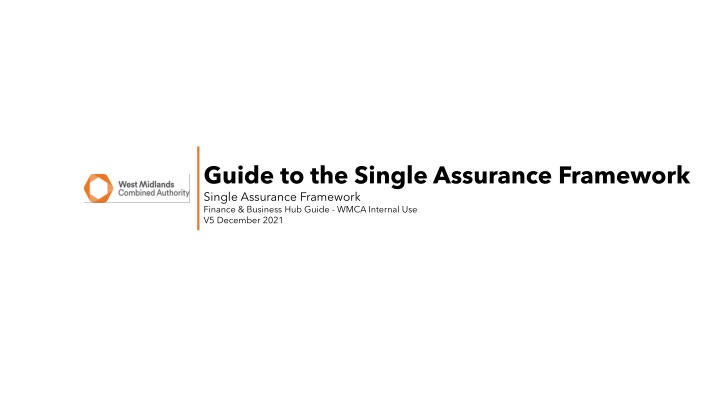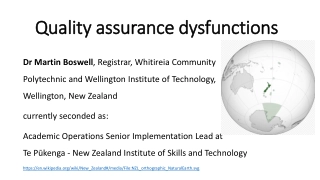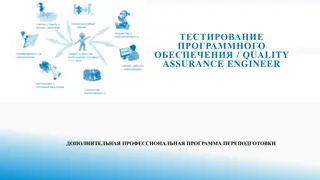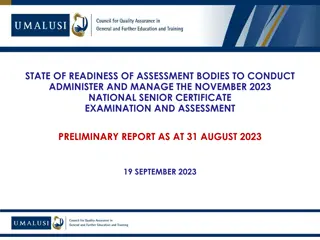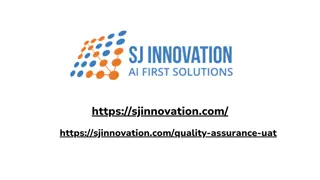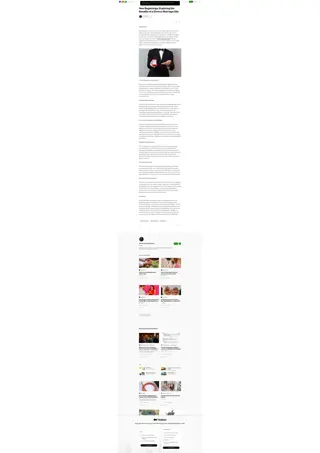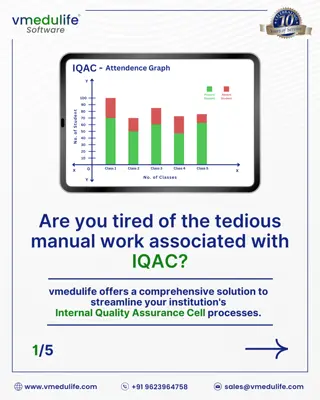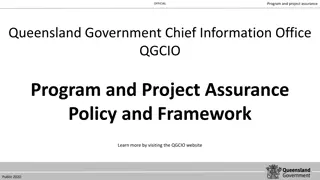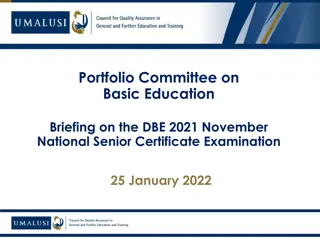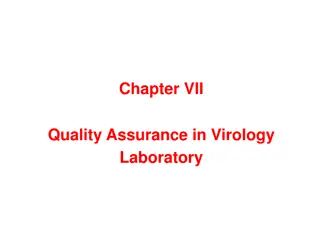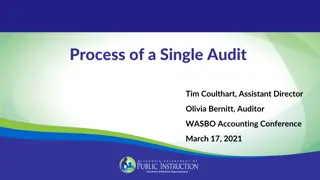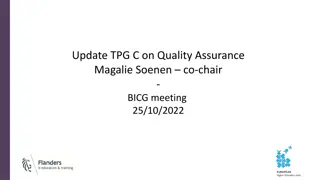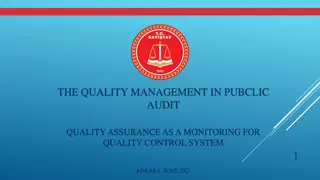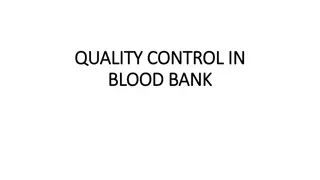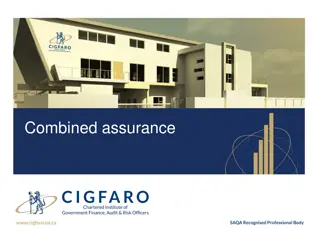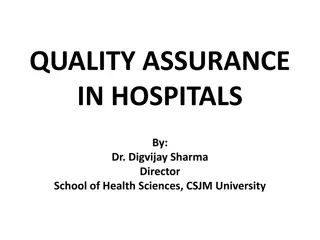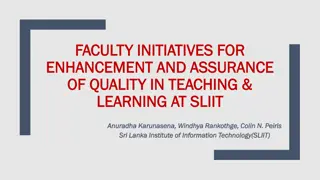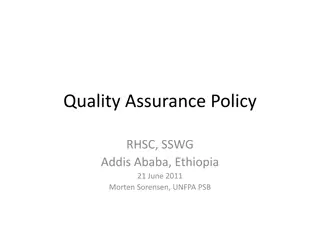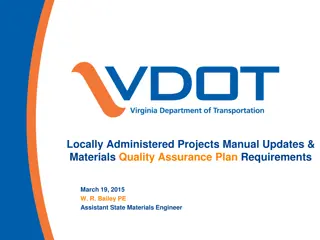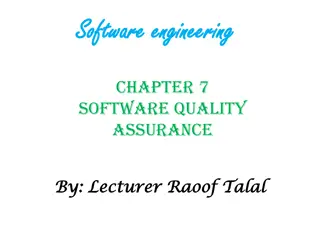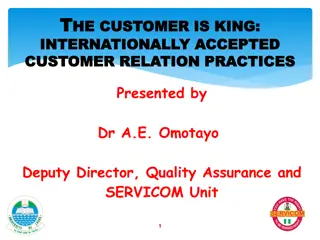Guide to the Single Assurance Framework
West Midlands Combined Authority (WMCA) has developed a Single Assurance Framework (SAF) to ensure consistency, accountability, and transparency in the application and approval of external funding opportunities and project development. The SAF outlines key processes for governance, oversight, and accountability to deliver confidence in decision-making and stewardship of public funds. It defines the lifecycle of a project, including initiation, development, and approvals stages, with built-in assurance and appraisal requirements.
Uploaded on Feb 20, 2025 | 0 Views
Download Presentation

Please find below an Image/Link to download the presentation.
The content on the website is provided AS IS for your information and personal use only. It may not be sold, licensed, or shared on other websites without obtaining consent from the author.If you encounter any issues during the download, it is possible that the publisher has removed the file from their server.
You are allowed to download the files provided on this website for personal or commercial use, subject to the condition that they are used lawfully. All files are the property of their respective owners.
The content on the website is provided AS IS for your information and personal use only. It may not be sold, licensed, or shared on other websites without obtaining consent from the author.
E N D
Presentation Transcript
Guide to the Single Assurance Framework Single Assurance Framework Finance & Business Hub Guide - WMCA Internal Use V5 December 2021
SINGLE ASSURANCE FRAMEWORK Version Control: Version Version No. No. Date Date Author Author Changes Changes Approval by Approval by V4 July 2020 Jodie Townsend (Consultant) Initial Publication Minor changes to reflect new organisation structure (Finance & Business Hub and Assurance & Appraisal Team creation), simplification of language and clarification throughout Programme Assurance & Appraisal Team V5 December 2021 Related Documents: Document Ref. Document https://www.wmca.org.uk/medi a/4238/strategic-hub-single- assurance-framework.pdf WMCA Single Assurance Framework https://intranet.wmca.org.uk/se ction/resource-hub/strategic- hub/single-assurance- framework/templates-forms Related templates, forms and guidance
SINGLE ASSURANCE FRAMEWORK West Midlands Combined Authority (WMCA) has developed a Single Assurance Framework (SAF) that applies to processes associated with the application and approval of all external funding opportunities and the initiation, development and delivery of projects programmes and activity that places a financial liability onto the WMCA that is not classed as a corporate continuous improvement/Business as Usual (BAU) project. A SAF provides consistency of approach for assurance, appraisal and decision-making across all funding pots. It also allows for proportionality to be applied for the development of business cases via defined development routes. Key processes for ensuring accountability, including public engagement, probity, transparency, legal compliance and value for money, as well as the processes for oversight of projects, programmes and portfolios and how the progress and impacts of these investments will be monitored and evaluated, have been (or are being) developed to ensure: significant financial and governance protections exist for the stewardship of public funds delivery of high standards of project development, approval, delivery and oversight trust is built in the organisation s officer expertise That consistency, controls and clarity are provided to deliver confidence in the WMCAs decision-making and ability to deliver the required assurance arrangements and lines of defence are embedded within project development and decision-making political and reputational risk is effectively managed More information can be found on our website, within the complete WMCA Single Assurance Framework document which is available here.
SINGLE ASSURANCE FRAMEWORK The SAF sets out the process for the lifecycle of a project and covers: Initiation Development; and Approvals stages It sets out what documents need to be completed, the standards and criteria that need to be met and the assurance and appraisal requirements. Additional guidance, templates and forms are available on our intranet here
The Initiation Stage Single Assurance Framework Finance & Business Hub Guide - WMCA Internal Use
SINGLE ASSURANCE FRAMEWORK: INITIATION The initiation stage is the first step in developing a business plan item, a proposal, idea or ambition. All proposals will be required to complete project initiation before they can progress into the project development stage. Project initiation, like the project development process that comes afterwards, is a Directorate led process; however, there are some consistent requirements that apply to all: requirement to consider and complete a Funding Initiation Document (FID) requirement to engage Legal, Finance and the Programme Assurance and Appraisal Teams at initiation
SINGLE ASSURANCE FRAMEWORK: INITIATION Directorate/ Portfolio Annual Plans will set out the activity that they intend to deliver that year. This will include a definition of the activity and how it will contribute towards delivering strategic objectives. Throughout that year Directorates will pull down Annual plan items to be initiated. Purpose of Annual Plan: Set out the WMCA priorities for 2019/20 for that Directorate/ Portfolio so that partners and stakeholders are clear on the key areas of focus Provide a strategic context for the WMCA as an organisation so that service plans and operational activity are aligned to the overall vision and priorities Enable the WMCA to articulate what is being delivered, and be able to oversee and review progress against priorities Partner organisations are likely to submit in-year submissions that are not included within the Annual Plan. These can still be made and will be considered by the appropriate Directorate arrangements. Items pulled from the Annual Business Plan or received in-year are considered by the appropriate WMCA Directorate.
SINGLE ASSURANCE FRAMEWORK: INITIATION DIRECTORATE PIPELINE MEETINGS At the Directorate Pipeline meeting the proposal is considered for initiation. To assist with this process a document entitled the Funding Initiation Document (FID) needs to be completed. The Directorate Pipeline meeting is where proposal submissions and project initiation will be considered. The Single Assurance Framework does not specifically require a Pipeline meeting to be set up by each Directorate, just for its purpose to be fulfilled. This means it could take place within existing Directorate governance arrangements as an agenda item or it could be specifically set up by Directorates as an additional meeting. The FID requires key information about the proposal to be recorded and for key considerations regarding its initiation to be considered. The FID completion process also involves determining the development route for a proposal, this involves completion of the route identification tool and for the result to be recorded in the FID. The purpose of the meeting is for items to be drawn from the Annual Plan and considered for initiation and for in-year submissions to be considered for initiation. This process will involve the appropriate officers from each Directorate as deemed to be required by the Executive Director. The FID will drive consideration behaviours to ensure that a clear strategic fit exists, and key financial and intervention considerations have taken place for every proposal. Directorate Pipeline/Initiation meetings require the attendance of: A finance representative is required to advise on completion of the FID as it relates to the following: Project proposers Relevant internal and external officers determined by each Directorate Finance Representative/Business Partner (Required) Legal Representative (Recommended) Assurance & Appraisal Team Representative (Required) a) Confirm funding allocation remains for Annual Plan items as agreed within the Annual Plan b) Advise on funding allocation requirements for in-year items (add to planning process for future years/ reprioritisation of Portfolio items/ need to identify new funding) It is a requirement of the Initiation Process that the following is undertaken: 1. Consideration of Annual Plan item or in-year submission 2. Completion/consideration of FID
SINGLE ASSURANCE FRAMEWORK: INITIATION The Initiation phase requires the approval of the Executive Director whether to: progress a project into either the project development stage, or the strategic planning stage or reject it Similarly, it is the Executive Director and Strategic Leadership Team (SLT) who is held to account by the WMCA Board for all Initiation decisions they make. Before an Executive Director progression decision to Development, can be taken, the FID must be completed to the satisfaction of the Executive Director and have received Finance sign-off. Agreement to progress means that Executive Directors have approved the initial (seed) funding in order to complete feasibility and prepare the next submission. Executive Directors may wish to make decisions themselves or to delegate them down to operational Directors/ Heads of Service, as appropriate. However, it is the Executive Director who is accountable for initiating an Annual Plan item or in-year submission. A decision to progress to the strategic planning process is relevant only to in-year submissions that are not included in the Annual Plan. In such a circumstance the Executive Director can accept the principle of the proposal and submit it to the strategic planning process for consideration for inclusion in future Annual Plans. A decision to reject can be taken if: a) It is decided that an Annual Plan item no longer is deliverable or a strategic fit due to changes that have occurred since it was added to the Annual Plan. b) If an in-year submission is not deemed to fit strategically with the WMCAs strategic objectives Executive Directors have 3 choices once a proposal has been considered for initiation; they are: Progression to development stage Progression to strategic planning stage Reject
SINGLE ASSURANCE FRAMEWORK: ROUTE IDENTIFICATION TOOL ROUTE IDENTIFICATION TOOL Completed by: Project ID: Project Name: Assurance & Appraisal Team Lead: Do external assurance and/or business case criteria requirements apply to your item/proposal? If other, please specify: Dept for Transport (DfT) Treasury (HMT) Yes Dept for Education (DfE) Constituent Council If yes, please identify: DLUHC (previously LEP No Home Office Other If Central Government (DfT/DfE/DLUHC etc.) assurance and/or business case requirements apply then you must follow route prescribed by that external requirement If non-Central Government assurance and/or business case requirements apply then you must complete route tool to identify recommended development route Please analyse statements below and check where statement applies to your item/proposal: ROUTE A Larger funding request envisaged to be greater than 5million ROUTE B Standard business case development route that is utilised The purpose of the Route Identification Tool is to identify the Business case development requirements for the proposal. It is completed by the Directorate during the Initiation Stage. The rationale and case for change is acceptable from FID stage There is only one scheme that is being progressed that is not a large programme that contains different themes with different timescales No options analysis is required as there is evidence of only one option that is viable Options appraisal and analysis is required There is no requirement for a large or complex procurement phase. OJEU is not required and a pre- competed framework or supplier is identified and available A procurement phase is required The Tool consists of a checklist to determine which development route best applies to deliver the necessary requirements and helps to ensure an appropriate level of proportionality is applied. Firm fixed costs can be identified and presented at the FBC stage with no/little cost assumptions ROUTE C ROUTE D The rationale and case for change is acceptable from the FID stage A large programme of projects is required No options analysis is required as there is evidence of only one option that is viable The projects have different start and finish dates and durations The project can move straight to the procurement phase and present the plan for that stage The development route determined by the Tool is noted within the FID. The projects could potentially take different approval routes There is a requirement for a procurement phase The aggregated effect of the projects are achieving the same objectives and outcomes This process is completed by the Directorate, with support from the Assurance & Appraisal Team, and the development route is confirmed during Directorate Pipeline Meetings. Firm fixed final costs will be identified and presented at the FBC stage ROUTE E ROUTE F Options appraisal and analysis is required for the project A smaller funding request envisaged to be less than 5 million There is no requirement for a large or complex procurement phase. OJEU is not required and a pre- competed framework or supplier is identified and available Case for change and rationale is still identified and presented Firm fixed final costs can be identified and presented at the FBC stage with no/little cost assumptions Options analysis is required, although a smaller number of options can be assessed There is no requirement for a large or complex procurement Firm fixed costs can be identified and presented at the FBC stage with no/little cost assumptions Which route has been identified as the appropriate option? : ROUTE A ROUTE D ROUTE B ROUTE E ROUTE C ROUTE F Does the Finance & Business Hub (Assurance & Appraisal Team) agree with the option identified? YES NO
SINGLE ASSURANCE FRAMEWORK: INITIATION ROUTES (where Central Governance requirements do not apply) Observations Report undertaken Financial & Legal Approval Required An overview of each Business Case is provided below: Business Justification Case (BJC) Programme Business Case (PBC) Funding Initiation Document (FID) Outline Business Case (OBC) Strategic Outline Case (SOC) The SOC provides the strategic rationale for the intervention and identified the critical success factors. Final Business Case (FBC) The FBC enables the procurement of the VFM solution, contracting the appropriate deal and planning for successful delivery. The PBC is produced when a strategically linked series of projects requires authorisation to progress. A programme is a series of planned measures, related events and co- ordinated activity in pursuit of an organisations long term goals. The PBC will outline the programme projects dossier including the indicative timeline and costs. Validates the strategic fit of the intended intervention. The BJC is a single stage business case process that is available for schemes that require less development. They are not novel or contentious so options analysis is reduced and where firm fixed prices are available and can be evidenced from historical delivery. A specific procurement phase is not required as pre-competed procurement arrangement can be utilised. The OBC determines VFM and prepares for the potential procurement by ascertaining affordability, the procurement proposal and funding requirement. Gains approval of initial (seed) funding in order to complete feasibility and prepare the next submission. The preferred option is derived via options analysis to achieve the optimum VFM and and stakeholders will understand the robustness of the proposal and the future direction of travel including an updated whole life cost estimation. At the conclusion of the FBC all dimensions of the five case model will have been completed and be fully matured. Key to this is firm fixed and accurate costs, M&E arrangements and delivery capability. At the conclusion of the OBC stage consent should be able to be established for the procurement phase of the project to go ahead or not. Identifies the likely development and approvals route. Indicates the indicative cost of the overall scheme to inform decision making
SINGLE ASSURANCE FRAMEWORK: INITIATION ROUTES (where Central Governance requirements do not apply) Route A Route B Route C Route D Route E Route F No Options analysis Standard 3 phase route Large programme requiring multiple linked projects No Options analysis required No Smaller investment that is not complex Procurement phase required No Procurement phase B E F A C D E F B A E Observations Report undertaken Financial & Legal Approval Required = A
The Development Stage Single Assurance Framework Finance & Business Hub - WMCA Internal Use
SINGLE ASSURANCE FRAMEWORK: DEVELOPMENT The development stage is the next step following the initiation process, this is the stage in which the relevant business cases are developed, assured and considered for progression into the approvals stage. This stage needs to be repeated whenever a business case is developed and needs approval. The project development process is Directorate led (with support and guidance provided by the WMCA Finance & Business Hub - Programme Assurance and Appraisal Team, to ensure a consistent approach is applied). It will make use of Directorate expertise, knowledge, experience and existing relationships and the tempo of development will be controlled by Directorates. Sponsors/Partners external to the WMCA will be led through the process by the lead Directorate within the WMCA. Determination of development routes (required business cases) will be Directorate/Sponsor led and all Business Cases are required to be developed in line with WMCA requirements. These requirements support alignment with any external development and assurance requirements (driven by Government Departments), and aim to eliminate, rather than create, duplication of effort. A maturity assessment for each business case is required to be completed by the Programme Assurance & Appraisal team within the Finance & Business Hub before the lead WMCA Executive Director considers a business case and agrees if it can be progressed into the approvals phase. Development Stage
SINGLE ASSURANCE FRAMEWORK: DEVELOPMENT - BUSINESS CASE Following successful progression through initiation it will be clear what the business case development route for your project is, you will know the number and type of business cases needed to be developed. Whatever the route; the business case must be developed to a defined standard, be subject to an out of directorate assurance assessment and have the relevant WMCA Executive Director approval to proceed to the approvals Phase. The Programme Assurance & Appraisal Team within the Finance & Business Hub can provide advice and guidance on the requirements of the SAF, how to construct a business case and the standards that a business case will be measured against throughout the development stage. The first piece of this process is developing the business case. The business case is developed by the sponsor or Directorate, they are responsible for the development of its content, the standard of information and ensuring that it meets the requirements set out by the WMCA through the SAF. Sponsors and Directorates are asked to engage early and regularly with the Programme Assurance & Appraisal Team throughout development to ensure business cases are on track and are sufficiently matured Ongoing support received throughout this phase from the Programme Assurance & Appraisal team The WMCA lead for all business cases will be the lead relevant Directorate, if a business case crosses several portfolios then the Programme Assurance & Appraisal team can advise on who that lead Directorate is. The lead Directorate is responsible for ensuring they, or partners, or the sponsor, meet deadlines, are aware of standards and requirements, engage the appropriate subject matter experts and technical appraisers and adhere to required formats when developing a business case. Business case authors are reminded that any business case, regardless of stage and value, must receive clearance from WMCA Legal and Finance before it can be considered for approval. The WMCA has a suite of business case templates together with supporting guidance and minimum standards to be met. Finance Business Partners and Procurement Leads should be engaged throughout the development of a business case. Business Case standards include alignment with HM Treasury s five case model, being Green Book compliant and meeting WMCA specific requirements on Inclusive Growth and alignment with Corporate aims and objectives.
SINGLE ASSURANCE FRAMEWORK: DEVELOPMENT - BUSINESS CASE Once a business case has been developed it will be subjected to a maturity assessment by the Programme Assurance & Appraisal Team from within the Finance & Business Hub. The maturity assessment is undertaken against the required standards expected of a business case and utilises HM Treasury s Green Book as a best practice guide. The output of the maturity assessment will be an Assurance Observations Report produced by the Programme Assurance Team from within the Finance & Business Hub. A report will be produced for every business case to be considered for approval by the WMCA, regardless of value and of stage of development. The Assurance Observations Report will identify how mature each of the five case dimensions of a business case are against HM Treasury criteria as well as WMCA requirements. The report will identify any key concerns identified within a business case and make recommendations on how those could be addressed. Further guidance on this process is available from the Programme Assurance & Appraisal Team. Through ongoing Directorate Pipeline Meetings, Directorates and Sponsors will be encouraged by the Programme Assurance & Appraisal team, to engage early in the business case development process. This early engagement will help ensure compliance with the SAF and ultimately, the development of better business cases. Ongoing support received throughout this phase from the Programme Assurance & Appraisal team Completed business cases plus the accompanying Assurance Observations Report are to be submitted to the lead WMCA Executive Director for consideration. This consideration is to determine whether the business case meets the standards required to allow it to enter the approvals process. By requiring the lead WMCA Executive Director to make this decision it makes that Executive Director responsible for driving the standards of the SAF for projects developed within their portfolio areas. It also makes them responsible for taking that project forward into the approvals process and having to account for its content. It is up to the Executive Director to decide if issues raised within the Assurance Observations report have been sufficiently addressed and if the business case is of the standard expected by the WMCA. Executive Directors can ask for further work to take place on a business case before progressing it if they feel that it is required. When a business case is progressed a Progression Sheet must be completed and signed off by the lead Executive Director.
The Approvals Stage Single Assurance Framework Finance & Business Hub Guide - WMCA Internal Use
SINGLE ASSURANCE FRAMEWORK: APPROVALS The approvals stage is part of the project development life cycle, it is where the WMCAs principles of robust investment decision-making are applied. This is also where an additional 2nd line assurance assessment will be undertaken to help better inform those with decision-making responsibility. The approvals process has been designed to ensure that a higher level of assurance activity is undertaken and considered in informing a higher level of investment decision- making, reflecting the agreed decision-making principles of WMCA and supporting the taking of robust and informed investment decisions. APPROVALS DELIVERS The approvals stage includes application of officer delegations and Member decision-making, building upon the assurance information and proposal development that takes place in the development stage to best inform decision- makers. Appropriate Officer Delegation Levels Statutory Officer/SRO engagement Further risk & investment appraisal Enhanced investment Panel to support I.P decision- making Enhanced role and remit for Investment Board The approvals stage of the project lifecycle is set out below in the dotted orange box.
SINGLE ASSURANCE FRAMEWORK: APPROVAL LEVELS Investment Programme Non-Investment Programme The Approvals process begins following successful progression through WMCAs Project Development stage which will result in a completed business case + Assurance observations Report + WMCA Executive Director Progression Sheet. The Approvals process requires this collection of documents to be considered by the appropriate approvals point which is determined by the required financial level of approval required. < 1Million Executive Director + Investment Programme SRO Executive Director Between 1Million - 5Million Statutory Officer Panel + Investment Programme SRO Statutory Officer Panel Between 5Million - 20Million Investment Board WMCA Board Those levels are as follows: > 20Million WMCA Board WMCA Board The first requirement of the approvals stage is to determine which approval is required, as stated this is determined by the level of financial approval required. It is also determined by whether the required funding approval is Investment Programme related. This is determined by whether that approval comes within the remit of the Investment Board, if it does then you follow the I.P approvals route and if it does not you follow the Non-I.P approvals route. The Initiation process should have determined which route you would need to follow, however if you are not clear you are advised to consult the Strategic Hub.
SINGLE ASSURANCE FRAMEWORK: APPROVALS UP TO 1MILLION APPROVALS UP TO 1MILLION WMCA Executive Directors have delegated approval authority up to the value of 1Million. For Non-Investment Programme approvals, the relevant Executive Director alone can approve a business case up to the value of 1Million. For Investment Programme approvals, the relevant Executive Director will also require the approval of the Investment Programme SRO. In such a circumstance the Programme Assurance & Appraisal team will submit the required papers to the Investment Programme SRO for consideration. The Investment Programme SRO has the option to request a Risk & Investment Appraisal is undertaken and/or that the item is considered by the Investment Panel to provide additional advice if it is deemed to be required by the Investment Programme SRO. SINGLE ASSURANCE FRAMEWORK: RISK & INVESTMENT APPRAISAL All approvals above 1Million are required to undergo a Risk & Investment Appraisal that is designed to provide further out of sponsor/Directorate assessment of certain aspects of a business case. The Risk & Investment Appraisal is undertaken by Risk Appraisers within the Programme Assurance & Appraisal team, its purpose is to provide a risk profile to help inform decision- makers when approving business cases above 1Million in value. The Risk & Investment Appraisal involves analysis of information within a business case, providing an objective perspective on: Analysis of content across the 5 case model Validation of evidence base/ content of the Economic Case Analysis of Net Present Social Value and Social Impact (with a narrative and score) Analysis of risks associated with delivery/ cost/ time / funding Analysis of financial, regulatory, investment, reputational and other risks and proposed risk mitigations Analysis of a Sponsor/Directorate response to the Assurance Observations Report The output of a Risk & investment Appraisal is a report providing a Risk Profile of the Business Case to help inform the decision-making process. The report will set out: An assessment of the level of risk in approving that Business Case Observations on how the level of risk could be mitigated
SINGLE ASSURANCE FRAMEWORK: APPROVALS BETWEEN 1MILLION AND 5MILLION APPROVALS BETWEEN 1MILLION - 5MILLION These approvals are still within the levels of officer delegations. Approvals between 1Million and 5Million are required to be considered and approved by the Statutory Officer Panel, this consists of the following WMCA Officers: Chief Executive Director of Finance (Section 151 Officer) Head of Governance (Monitoring Officer) Non-Investment Programme approvals only require Statutory Officer Panel consideration, however Investment Programme approvals also require the involvement of the Investment Programme SRO who, in such circumstances, will sit on the Panel or provide the Panel with their perspective. SINGLE ASSURANCE FRAMEWORK: APPROVALS ABOVE 5MILLION APPROVALS ABOVE 5MILLION Approvals above 5Million are above the levels of officer approval delegations and must therefore be considered and approved by Boards consisting of regional political representatives. Decision-Makers are asked to consider the Business Case + Assurance Observations Report + Executive Director Progression Sheet + Risk & Investment Appraisal in coming to a decision. In order to support decision-making Boards, there are advisory support panels who will review a business case and supporting documentation and question the Sponsor/Executive Director before Board consideration. The Investment Panel exists to support the Investment Board whilst the Advisory Panel exists to support the WMCA Board, each Panel will review proposals going to their respective Parent Board in order to undertake the following functions to support effective decision-making: identify key lines of enquiry for the Parent Board to focus on validate and challenge proposal content validate and challenge external review of proposal validate and challenge the quality and robustness of proposal content ensure a consistent approach to challenging HMTs 5 case elements within Business Cases examination of Proposal Observation report produced during development that highlights Case Maturity, compliance with guidelines and standards and appraises proposals examination of key risks and investment considerations Each Panel will provide their respective Parent Board with a output report for each proposal it is due to consider, detailing the Panels observations following consideration. This will include a summary of the proposal that will highlight the strengths and weaknesses of a proposal, provide observations of the level of investment risk of approving that proposal and provide any recommendations for improvement or to mitigate risks. For example, additional conditions to be added to funding agreements, conditions for withdrawal of support, additions to M&E plans.
SINGLE ASSURANCE FRAMEWORK: APPROVALS OVER 5MILLION APPROVALS ABOVE 5MILLION Each Panel will assist its Parent Board s decision-making role by highlighting key lines of enquiry for it to focus on and by making recommendations on how the proposal can be improved or risks can be mitigated. The Investment Board will consider required approvals above 5Million for Investment Programme whilst the WMCA Board will consider those that are Non- Investment Programme. Additionally, there is a further role for WMCA Board in approving Investment Programme approvals that are above 20Million. In such circumstances, the proposal will first be considered by the Investment Board who will then make a recommendation on approval to the WMCA Board to consider. The purpose of the Approvals process is to ensure that decision-makers are as informed as they can be when required to make a decision. In order to achieve this the SAF looks to deliver: Appropriate initiation process that drives strategic fit Proportionate business case development process that meets national and WMCA standards of development Trusts Directorate expertise to develop required business cases Utilises out of sponsor assurance review and risk & investment appraisal Utilises Panel support to focus Board considerations and decision-making
SINGLE ASSURANCE FRAMEWORK: This is all part of the WMCA approach to deliver ever increasing levels of assurance to support decision-making on ever increasing levels of financial liability, as set out in the diagram below. WMCA has agreed that all proposals will deliver the following level of Assurance as standard : Initiation process to ensure strategic fit, the funding exists and to identify intended outputs that will contribute to delivery of strategic objectives (the golden thread) All projects to comply with the highest level of assurance that applies to funding (DfT, MHCLG, DfE, Treasury Business Case requirements) All projects to proportionately comply with HMTs 5 Business Case elements model (Strategic/ Economic/ Commercial/ Financial/ Management) Projects developed in line with identified WMCA minimum standards of project development Legal and Finance sign off requirement Guidance provided to Exec. Director to assist approval decision (maturity assessment, observations on compliance with WMCA standards) As you then increase the level of financial approval required you assist decision-makers be adding the risk & investment appraisal to better inform decision-making through the production of a risk profile. As you further increase the level of financial liability you then provide the appropriate Panel support to help inform Board considerations.
SINGLE ASSURANCE FRAMEWORK: Additional Information, Guidance & Support If you require any further information, guidance or support on any stage of the Single Assurance Framework, please contact the programme Assurance & Appraisal Team within the Finance & Business Hub saf@wmca.org.uk
